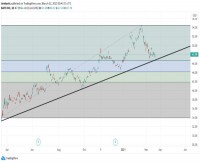|
Opalesque Industry Update - Managed Funds Association (MFA) voiced concern to the European Supervisory Authorities (ESAs) about the new measures and technical criteria added to the Sustainable Finance Disclosure Regulation (SFDR). Additionally, MFA urges the ESAs to consider the range of strategies and tools utilised by alternative asset managers when reviewing the SFDR framework. MFA's views were expressed in a letter responding to the ESAs' joint consultation on the review of the SFDR Delegated Regulation.
MFA's letter highlights that alternative asset managers utilise a broad range of investment strategies, many of which take into account climate risk. Some managers also offer products with specific climate-related objectives. As a result, MFA emphasises that the SFDR review should consider how certain tools used by alternative asset managers, including short selling and derivatives, can be used to help achieve sustainability outcomes by influencing the cost and allocation of capital. "MFA is grateful for the ESAs' work building additional clarity and legal certainty into the SFDR. However, additional requirements should be delayed until the ESAs can address SFDR's interoperability and data availability challenges," said MFA Head of EU Government Affairs Taggart Davis. "It is crucial that the SFDR review recognises the important role that the tools and strategies used by alternative asset managers have in advancing sustainability goals. We look forward to working with the ESA and policymakers across the continent as they advance their sustainable finance agenda." MFA appreciates the ESAs' efforts to improve market clarity with proposed amendments and additions to the Principle Adverse Impacts (PAI). However, the letter highlights concern about timing and data availability. Given the upcoming holistic review of SFDR by the European Commission, the newly finalised disclosure standards by the International Sustainability Standard Board, and the continued rollout of the Corporate Sustainability Reporting Directive, MFA cautions that introducing new measures and technical criteria could sow confusion in markets. In addition, the letter notes that the lack of available market data would impede compliance with the new indicators. More details are available below. The SFDR currently does not recognise the role tools such as derivatives and short selling can play in contributing to the reallocation of capital. From the letter: "While many investors utilise tools such as engaging directly with corporate boards or exercising voting rights as shareholders to influence company behavior, others gain exposure to companies through derivatives or short selling. The SFDR focuses overwhelmingly on sustainability in securities on the long side; while the role of investment tools that contribute to the reallocation of capital through other means is overlooked under the Regulation." In addition, the difficulty of acquiring the data to comply with the existing mandatory PAI framework limits the quality of PAI reporting. From the letter: "Acquiring the necessary data for compliance with the existing mandatory PAIs is already a prodigious challenge for financial market participants, including those in the alternative asset management sector. A significant data gap exists that greatly limits the quality of PAI reporting. While technical work continues to flesh out reporting requirements for investors, policymakers have yet to formally acknowledge that the lack of data in the market is a fundamental flaw of the SFDR that will take time to address."
|
Industry Updates
MFA highlights concerns to ESAs about proposed changes to SFDR
Wednesday, July 05, 2023
|
|





 RSS
RSS








